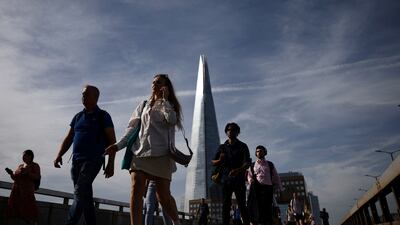Wages in the UK grew at the fastest rate in more than two decades, but failed to keep pace with prices in the three months to November, as inflation remained historically high.
Pay including bonuses rose by an annual 6.4 per cent from September to November, representing the strongest growth rate seen outside of the pandemic.
Growth in pay was strongest in the private sector, at 7.2 per cent, compared to 3.3 per cent for the public sector.
But after adjusting for inflation, which is currently running at 10.7 per cent, pay with and without bonuses both fell by 2.6 per cent.
That was slightly smaller than the record fall in real pay in April to June, but remains “among the largest falls in growth since comparable records began in 2001”, the Office for National Statistics said.
Alice Haine, personal finance analyst at Bestinvest, the DIY investment platform and coaching service, said: “Yet again, the purchasing power of Britain’s workers is taking a pummelling meaning incomes simply don’t stretch as far — not a huge surprise when you consider the many blows to worker pay from the soaring cost of goods and services to rising mortgage and debt repayments and the highest tax burden since the 1940s.
“With the pay squeeze intensifying and typical households likely to be £2,100 worse off by April 2024, according to the Resolution Foundation, the industrial action rapidly becoming a regular feature of post-pandemic life, as workers down tools in a bid to secure pay rises more closely aligned to the inflation rate, is likely to persist.”
Economists say the Bank of England is worried that the acceleration in pay growth will make it harder to rein in Britain's high inflation rate.
It is expected to raise interest rates for a 10th time in a row early next month.
BoE Governor Andrew Bailey said on Monday that a shortage of workers in the labour market posed a major risk to forecasts that inflation will fall from its current levels above 10 per cent.
“Together with last week’s stronger than expected GDP data, we anticipate this will provide enough evidence for the Bank of England to clinch another interest rate increase at its February meeting,” said Yael Selfin, chief economist at KPMG UK.
The main question for investors is the scale of the increase as the British central bank weighs up the risk of a recession with the need to fight inflation.
Financial markets were mostly pricing in a half percentage-point hike in Bank Rate to 4.0 per cent on February 2, but they pointed to a more than one-in-three chance of a smaller 25 basis-point increase.
Sterling rose after Tuesday's data and was up by 0.1 per cent on the day against the US dollar and the euro.
ONS data also showed Britain's jobless rate held at 3.7 per cent, close to its lowest in almost 50 years. Employment rose by a faster-than-expected 27,000.
The overall employment rate was estimated at 75.6 per cent in the three months to September.
That was largely unchanged compared with the previous three months, but one per cent lower than before the pandemic, said the ONS.
“In the latest three-month period, the number of people unemployed for up to six months increased, driven by those aged 16 to 24 years,” it said.
“Those unemployed for over six and up to 12 months increased, while those unemployed for over 12 months decreased in the recent period."


